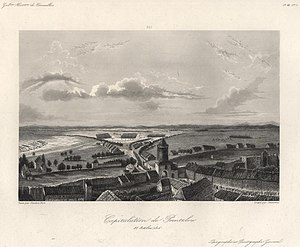Battle of Prenzlau
| Battle of Prenzlau | |||||||
|---|---|---|---|---|---|---|---|
| Part of the War of the Fourth Coalition | |||||||
 Capitulation of Prenzlau by Simeon Fort (1793–1861). |
|||||||
|
|||||||
| Belligerents | |||||||
|
|
|
||||||
| Commanders and leaders | |||||||
|
|
|
||||||
| Strength | |||||||
| 12,000, 12 guns | 12,000, 64 guns | ||||||
| Casualties and losses | |||||||
| Slight | 10,000, 64 guns | ||||||
In the Battle of Prenzlau or Capitulation of Prenzlau on 28 October 1806 two divisions of French cavalry and some infantry led by Marshal Joachim Murat intercepted a retreating Prussian corps led by Frederick Louis, Prince of Hohenlohe-Ingelfingen. In this action from the War of the Fourth Coalition, Hohenlohe surrendered his entire force to Murat after some fighting and a parley. Prenzlau is located about 90 kilometers north of Berlin in Brandenburg, Germany at the intersection of routes B109 and B198.
After their catastrophic defeat at the Battle of Jena-Auerstedt on 14 October, the Prussian armies fled north to the Elbe River with Emperor Napoleon I of France's victorious army in hot pursuit. The Prussians crossed the Elbe near Magdeburg and marched northeast, trying to reach safety behind the Oder River. Part of Napoleon's army thrust east to seize Berlin, while the rest followed the retreating Prussians. From Berlin, Murat moved north with his cavalry, trying to head off Hohenlohe.
After several clashes on 26 and 27 October, Murat arrived at Prenzlau on the heels of Hohenlohe's corps. Fighting occurred in which several Prussian units were captured or cut to pieces. Murat then bluffed the demoralized Hohenlohe into surrendering his entire corps by claiming that the Prussians were surrounded by overwhelming forces. In fact, apart from a brigade of infantry, only Murat's cavalry were in the vicinity. In the days afterward, the French cowed several more Prussian forces and fortresses into surrendering. Finding its way to the northeast blocked, a second corps of retreating Prussians under Gebhard Leberecht von Blücher veered northwest toward Lübeck.
...
Wikipedia
